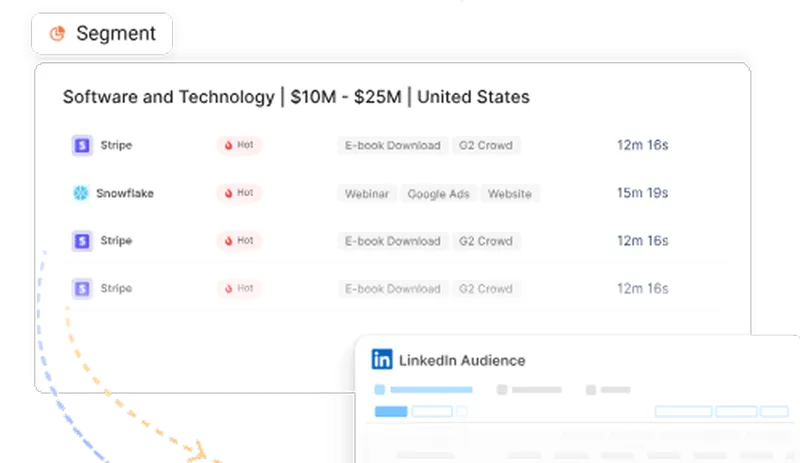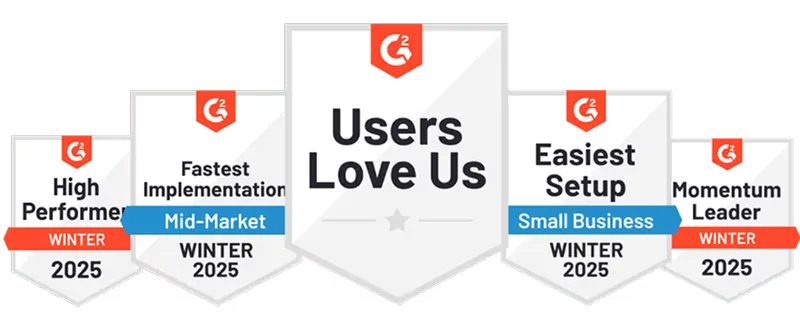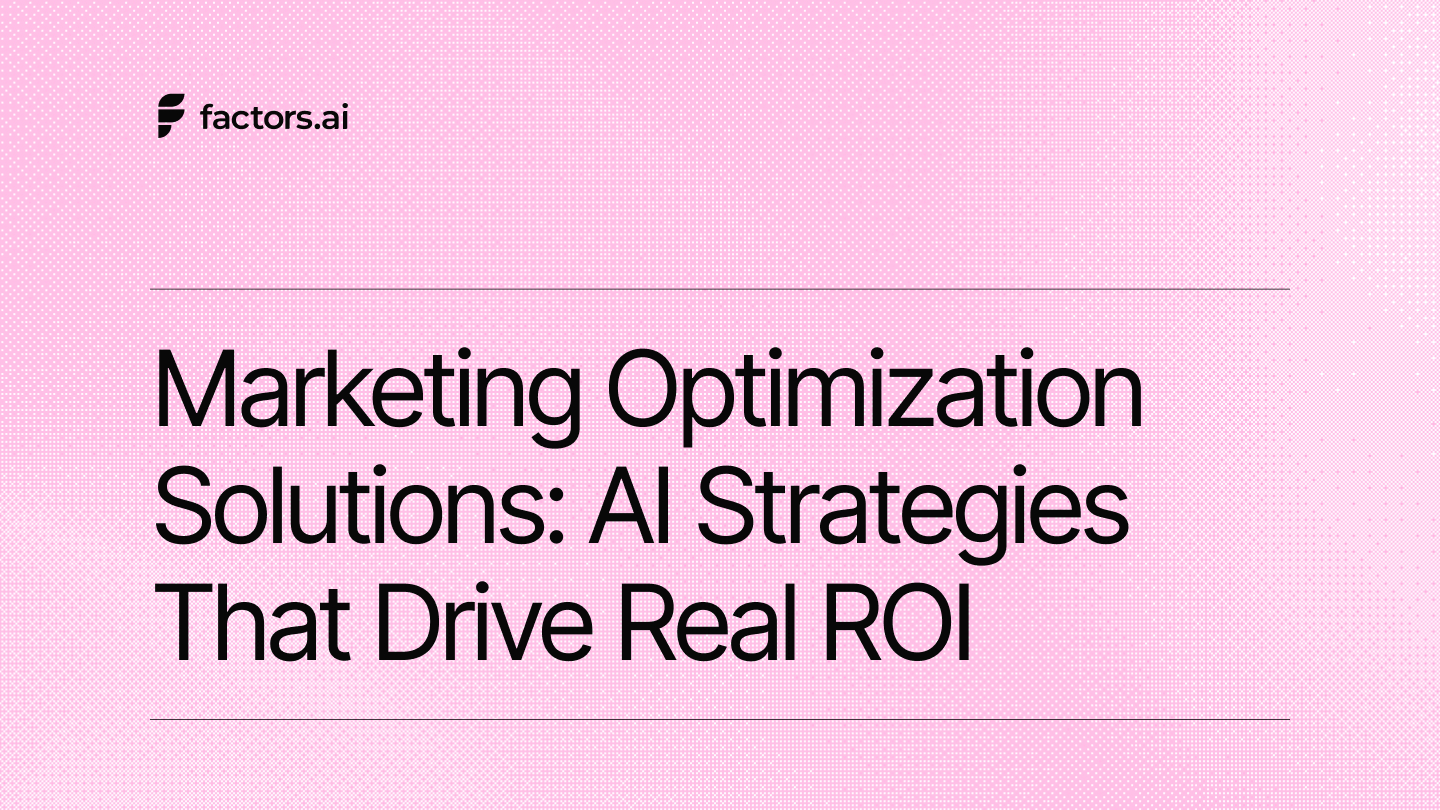Best 9 Performance Marketing Hacks you Need to Know in 2025
Discover the best 9 performance marketing hacks to supercharge your strategy in 2025. Learn actionable tips and stay ahead of the competition.
Are you a B2B SaaS marketer struggling to tackle the challenges of performance marketing for your brand?
Are you finding it difficult to identify anonymous companies visiting your website, analyze your buyer journey, and measure ROI across campaigns, content, and sales touchpoints?
If so, then this guide will help you.
In today's competitive business landscape, B2B SaaS marketers face numerous obstacles when it comes to performance marketing.
One of the biggest challenges is analyzing the data from their ads, website, social media & campaigns.
Without this crucial information, they would be missing out on valuable opportunities to engage with potential customers and drive conversions. Additionally, analyzing their buyer journey and measuring ROI across various marketing channels and touchpoints can be a daunting task, leaving unsure of which strategies are truly effective.
Let's delve into the blog to gain further insights and expand our knowledge on the subject.
What is Performance Marketing?
Performance marketing is a data-driven marketing strategy that focuses on driving specific actions or outcomes, such as conversions, leads, or sales.

Unlike traditional marketing methods that rely on broad reach and brand awareness, performance marketing is highly targeted and measurable, allowing marketers to track the effectiveness and ROI of their campaigns with precision.
In performance marketing, marketers set clear objectives and pay for marketing activities based on the desired performance metrics achieved. This could include pay-per-click (PPC) advertising, affiliate marketing, email marketing, content marketing, and other forms of digital advertising.
The success of performance marketing campaigns is determined by how well they achieve the intended outcomes and deliver a positive return on investment.
For B2B SaaS marketers, performance marketing is particularly relevant as it allows them to optimize their marketing efforts and allocate resources more effectively. By focusing on measurable actions and outcomes, B2B SaaS marketers can identify which strategies and channels are driving the best results, allowing them to refine their campaigns and generate higher-quality leads and conversions.
5 Reasons to Know Why Performance Marketing is Important?
Performance marketing is a crucial skill for every marketer to master. Here are five reasons why it is essential and relevant to your marketing success:

Measurable Results
Performance marketing allows you to track and measure the effectiveness of your marketing campaigns. By analyzing key metrics such as conversions, leads, and sales, you can gain insights into what strategies are working and make data-driven decisions to optimize your marketing efforts.
Cost Efficiency
With performance marketing, you only pay for the desired outcomes achieved, such as clicks or conversions. This cost-efficient approach ensures that your marketing budget is allocated to the strategies that deliver tangible results, maximizing your return on investment.
Targeted Audience Reach
Performance marketing enables you to precisely target your ideal audience based on demographics, interests, and online behavior. By reaching the right people at the right time, you can increase the chances of generating high-quality leads and conversions.
Scalability and Flexibility
Performance marketing allows you to scale your campaigns based on your business needs. You can easily adjust your budgets, test different strategies, and optimize your campaigns in real-time, ensuring that your marketing efforts align with your goals and adapt to changing market conditions.
Continuous Improvement
One of the key advantages of performance marketing is the ability to gather data and insights throughout the entire customer journey. This data-driven approach enables you to identify areas of improvement, refine your messaging, and enhance your customer experience, resulting in higher engagement and better overall performance.
You can hire an experienced marketing automation consultant to your team to unlock the full potential of marketing campaigns, understand customer journey, drive meaningful results, and stay ahead in the competitive B2B SaaS landscape.
9 Performance Marketing Hacks in 2025
Are you ready to revolutionize your performance marketing strategy in 2025?
My unique process brings you nine powerful performance marketing hacks designed to elevate your campaigns and drive exceptional results. From leveraging user-generated content to optimizing for voice search, these hacks are based on the latest industry insights and innovative techniques. Get ready to take your marketing efforts to new heights and outperform your competition.
Here are the nine performance marketing hacks for 2025:
1. Hack the Micro-Moments
In today's digital landscape, capturing your audience's attention in specific micro-moments along their customer journey is crucial. Micro-moments are instances where individuals are actively seeking information, making decisions, or looking for solutions. By identifying these micro-moments and tailoring your marketing messages to address their needs, you can effectively engage your audience and drive conversions.
Example: Suppose you are a B2B company specializing in project management software. One micro-moment could be when a potential customer searches for "how to streamline project workflows."

In response, you create content that addresses this pain point, such as a blog post titled "5 Proven Strategies to Streamline Your Project Workflows."
Pro Tip
- Conduct thorough audience research to identify micro-moments relevant to your target market.
- Utilize keyword research tools to discover common search queries associated with these micro-moments.
- Develop content that aligns with these moments and provides valuable solutions.
- Incorporate targeted keywords in your contents ensuring to rank in search results.
2. Optimize for Voice Search
In the era of voice assistants and smart devices, optimizing your content for voice search is essential to ensure your brand remains visible and accessible to your target audience. Voice search queries tend to differ from traditional text-based searches, as they are more conversational and often phrased as questions. By adapting your content strategy to accommodate these voice-based queries, you can improve your chances of appearing in voice search results and capturing valuable organic traffic.

Example: Let's say you run a B2B company that offers customer relationship management (CRM) solutions. Instead of solely focusing on traditional keyword phrases like "CRM software," optimize for voice search queries such as "What are the best CRM software options for small businesses?" or "How can CRM software improve sales productivity?"

Pro Tip:
- Incorporate long-tail keywords and conversational language into your content.
- Consider creating FAQ pages or blog posts that directly address common questions related to your industry or product.
- Leverage structured data markup (such as schema.org) to provide search engines with clear information about your content, making it easier for them to understand and present in voice search results.
3. Leverage User-Generated Content
User-generated content (UGC) is a powerful tool that allows your customers to become advocates for your brand. It involves encouraging and showcasing content created by your users, such as reviews, testimonials, social media posts, or case studies. Leveraging UGC can build trust, increase engagement, and enhance your brand's credibility in the eyes of your target audience.
Example: Let's say you operate a B2B company that provides call tracking software for small scale businesses. You can encourage your customers to share their success stories, positive experiences, or case studies using your software.

Highlight these stories on your website, social media channels, or even in your email newsletters to demonstrate the value and benefits of your product through authentic and relatable experiences.
Pro Tip
- Create dedicated spaces on your website or social media platforms where users can submit their content.
- Offer rewards, discounts, or recognition to those who contribute valuable UGC.
- Monitor your social media channels, online reviews, and other platforms where customers may leave feedback.
4. Embrace Personalization
Personalization has become a crucial aspect of effective marketing including tailoring your marketing messages, offers, and recommendations based on individual customer preferences and behaviors. By delivering personalized experiences, you can enhance engagement, build stronger connections with your audience, and ultimately drive higher conversion rates.
Example: Suppose you are a B2B company that offers email marketing software. Instead of sending generic email campaigns to your entire subscriber list, segment your audience based on their interests, past interactions, or purchase history. Then, personalize your email content, subject lines, and product recommendations to cater to each segment's specific needs. For example, you can send targeted emails about advanced email automation features to customers who have shown interest in automation tools.

Pro Tip:
- Utilize marketing automation workflows to segment audience based on the data generated.
- Craft personalized messages that resonate with each segment, addressing their pain points and highlighting the benefits of your solution.
- Consider using dynamic content that adapts to each recipient's preferences in real-time.
5. Harness the Power of Influencer Marketing
Influencer marketing has emerged as a highly effective strategy to expand your brand's reach, build credibility, and drive engagement. By collaborating with influencers who align with your brand values and have a dedicated following, you can leverage their influence and tap into their established trust to promote your B2B SaaS solution.
Example: Suppose you offer project management software for creative agencies. Identify influencers in the creative industry, such as renowned designers or project management experts, who have a strong online presence and a relevant audience. Partner with them to create sponsored content, co-host webinars, or conduct interviews to showcase how your software solves common pain points for creative agencies.
Pro Tip:
- Look for influencers whose values align with your brand and who have an engaged and relevant audience.
- Establish clear goals and expectations when partnering with influencers to ensure a successful and mutually beneficial partnership.
- Develop a partnership strategy that aligns with your marketing goals and leverage the influence of these trusted individuals to expand your brand's reach and drive meaningful engagement.
6. Implement Video Marketing Strategies
Video marketing has become increasingly dominant in the digital industry, offering a powerful medium to engage your audience, deliver compelling messages, and increase brand recall. By implementing effective video marketing strategies, you can captivate your audience and drive higher levels of engagement and conversion.

Example: Suppose you are a B2B company providing customer support software. Create tutorial videos using an online video editor that showcase how to maximize the features of your software, address common pain points, or provide tips for efficient customer support. You can also feature customer success stories through video testimonials, where clients share their positive experiences using your software.
Pro Tip:
- Optimize your videos for different platforms and devices. Keep them concise, attention-grabbing, and focused on delivering value within the first few seconds.
- Use storytelling techniques to engage your audience and showcase real-life scenarios or case studies.
- Include a strong call-to-action at the end of each video to encourage viewers to take the desired action, such as visiting your website, signing up for a trial, or contacting your sales team.
- Invest in quality production, including clear audio, engaging visuals, and professional editing.
7. Optimize for Mobile-First Experiences
In today's mobile-driven world, optimizing your website and marketing efforts for mobile devices is essential. With the majority of internet users accessing content from mobile devices, delivering seamless mobile experiences is crucial for engaging your audience and driving conversions. By prioritizing mobile-first experiences, you can ensure that your brand remains accessible and user-friendly on smartphones and tablets.

Example: Suppose you offer a B2B SaaS solution for project collaboration. Optimize your website by implementing responsive design, which automatically adjusts the layout and content based on the user's device screen size. Ensure that your website loads quickly, provides intuitive navigation, and presents key information clearly, even on smaller screens. Simplify forms and optimize them for touch input to streamline the user experience on mobile devices.
Pro Tip:
- Test your website's mobile-friendliness using tools like Google's Mobile-Friendly Test.
- Optimize your website's loading speed by compressing images, enabling browser caching, and minimizing unnecessary code.
- Prioritize the most important content and call-to-action buttons to ensure they are easily accessible and visible without excessive scrolling.
- Continuously test your website across different devices and screen sizes to ensure a seamless experience.
8. Utilize AI-Powered Automation
Incorporating AI-powered automation into your performance marketing strategy can greatly streamline your processes, save time, and increase efficiency. By leveraging automation tools, you can automate repetitive tasks, personalize communication, and deliver targeted content at scale, ultimately enhancing the effectiveness of your campaigns.
Example: Suppose you run a B2B company that offers marketing automation software. Utilize an AI-powered email marketing automation tool to automatically segment your audience based on their behavior and preferences. Set up automated email workflows that nurture leads, send personalized recommendations, and follow up with relevant content based on specific triggers or actions taken by the recipients.

Pro Tip:
- Begin by identifying repetitive tasks that can be automated, such as email scheduling, social media posting, or lead scoring.
- Integrate your automation tools with your customer relationship management (CRM) system to sync data and ensure a seamless flow of information.
- Regularly analyze and optimize your automation workflows to ensure they align with your business goals and provide a personalized experience for your audience.
- Map out your customer journey and identify opportunities where automation can enhance your marketing efforts.
9. Experiment with Emerging Technologies
Staying ahead in the fast-paced digital landscape requires embracing emerging technologies and exploring innovative ways to engage your audience. By experimenting with technologies like augmented reality (AR), virtual reality (VR), or interactive content, you can differentiate your brand, create memorable experiences, and leave a lasting impression on your target audience.
Example: Suppose you offer a solution for architectural design. Develop an AR mobile app that allows users to visualize how their designs would look in real-world environments. Users can use their smartphones or tablets to overlay virtual 3D models onto physical spaces, enabling them to experience and interact with architectural designs in an immersive way.
Pro Tip:
- Start by researching emerging technologies that align with your industry and target audience.
- Collaborate with technology partners or experts to bring your ideas to life.
- Prioritize providing value and enhancing the user experience when incorporating emerging technologies into your campaigns.
{{CTA_BANNER}}
Key Considerations For Implementing Performance Marketing
Implementing performance marketing requires careful consideration of several key factors to ensure success. Here are some additional insights to keep in mind:
Data-driven Decision Making
Performance marketing thrives on data and analytics. It's crucial to establish a robust data infrastructure, including proper tracking, measurement, and analysis of key performance indicators (KPIs). Leverage tools like Google Analytics, Factors.AI, or other marketing analytics platforms to gather actionable insights that inform your marketing strategies and optimizations.
Continuous Testing and Optimization
Performance marketing is an iterative process. Embrace a culture of continuous testing and optimization to refine your campaigns and improve their effectiveness. Conduct A/B tests, experiment with different ad creatives, landing page designs, and messaging variations to identify what resonates best with your audience. Tools like Optimizely, Google Optimize, or Factors.AI's experimentation features can assist in running controlled experiments and optimizing your campaigns based on data-driven insights.
Integration and Alignment
Ensure seamless integration and alignment between your marketing, sales, and customer success teams. Collaboration and communication are essential to create a cohesive customer journey and provide a unified experience. Implement marketing automation tools like Factors.AI to streamline lead management, nurture customer relationships, and foster a data-driven approach across departments.
By considering these insights and incorporating them into your marketing automation strategy, you can maximize the impact of your campaigns, drive conversions, and achieve your business goals.
How to Choose the Best Performance Marketing Tool?
To further enhance your performance marketing efforts, selecting the right performance marketing tool is crucial. Here are a few considerations to help you choose the best tool for your needs:
Assess Your Goals and Requirements
Start by clearly defining your goals and requirements. Identify the specific functionalities you need in a performance marketing tool, such as campaign management, analytics, automation, or integrations with other platforms. Consider factors like scalability, ease of use, and pricing models that align with your budget.
Research and Compare Options
Conduct thorough research on different performance marketing tools available in the market. Compare their features, user reviews, customer support, and reputation in the industry. Factors.ai offers a comprehensive suite of performance marketing features designed to optimize campaigns, enhance targeting capabilities, streamline data analysis, and maximize ROI.
Request Demos and Trial Periods
Once you have shortlisted a few tools, request demos or trial periods to evaluate their functionality and user experience firsthand. This will help you assess how intuitive the tool is, how well it aligns with your workflow, and whether it provides the necessary insights and functionalities to meet your performance marketing objectives.
Remember, the best performance marketing tool for your business will depend on your unique requirements, objectives, and budget. Take the time to thoroughly evaluate and compare different options to ensure you choose a tool that empowers you to optimize your campaigns, drive results, and achieve your performance marketing goals.
To enhance performance marketing, businesses can implement nine innovative strategies:
1. Hack the Micro-Moments: Engage users when they are making quick decisions, typically on mobile devices.
2. Optimize for Voice Search: As voice-activated devices become more common, optimizing for conversational queries is essential for staying ahead.
3. Leverage User-Generated Content: Customer-created content, such as reviews or social media posts, can increase trust and drive engagement.
4. Implement AI-Powered Chatbots: Use chatbots to provide real-time customer support, increasing customer satisfaction and conversion rates.
5. Utilize Predictive Analytics: By analyzing data, businesses can anticipate future customer behavior, allowing for more personalized and targeted marketing efforts.
6. Focus on Mobile Optimization: Ensure that mobile users have a seamless experience, as mobile traffic continues to rise.
7. Employ Retargeting Strategies: Re-engage visitors who didn’t convert on the first visit with tailored ads to increase conversion rates.
8. Personalize Email Campaigns: Customize emails based on user behavior and preferences to increase open rates and engagement.
9. Analyze and Iterate: Constantly evaluate the performance of marketing strategies and make data-driven adjustments.
By leveraging these strategies, businesses can significantly improve their marketing ROI and customer engagement.
Wrapping Up and My Experience With Performance Marketing
In conclusion, as we wrap up this tutorial on performance marketing hacks in 2025, I want to congratulate you on completing this insightful journey. I hope that you've found these strategies and insights to be valuable assets for your performance marketing endeavors.
With over 10 years of hands-on experience in the field, I have witnessed firsthand the transformative power of these hacks. Collaborating with diverse clients across industries, I have had the privilege of optimizing campaigns, driving conversions, and helping businesses achieve their goals.
As you apply these strategies and leverage the insights provided, you can position yourself to drive exceptional performance and stay ahead of the competition in the dynamic world of performance marketing. Embrace these powerful tools and techniques, and propel your marketing efforts to new heights of success.
See how Factors can 2x your ROI
Boost your LinkedIn ROI in no time using data-driven insights


See Factors in action.
Schedule a personalized demo or sign up to get started for free
LinkedIn Marketing Partner
GDPR & SOC2 Type II
.svg)










